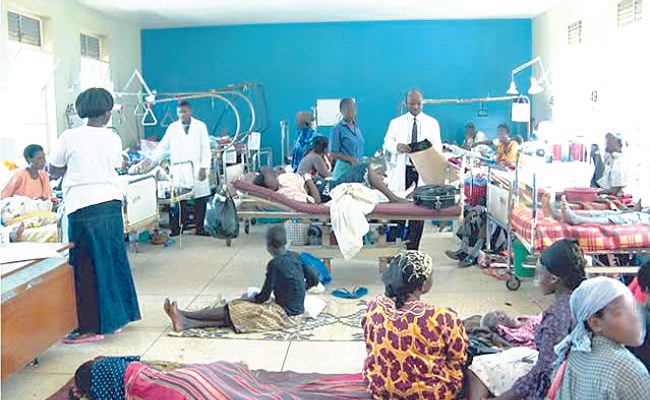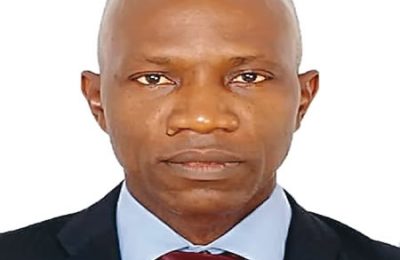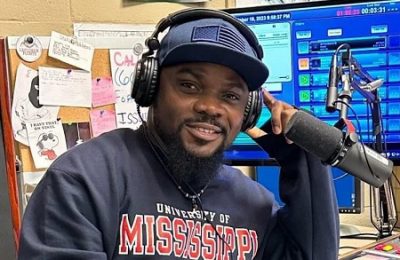As the crisis facing the country’s health sector, SADE OGUNTOLA reports on the experiences of patients enduring long waiting time to see the remaining few doctors and other health service providers in many public hospitals.
MR Adeniran Adekola, 75 years old, was brought to the Accident and Emergency Unit of the University College Hospital (UCH) in an unconscious state. The referral was from a clinic in the community. But what got the patient’s relatives jittery was when they were told that only two doctors were available to attend to the critically ill persons brought to the hospital.
“I was scared that it would never be my dad’s turn.” Sina, Mr Adekola’s son, who is also a teacher in a neighbouring community, recalled. “My uncle, knowing that there are few doctors available at the Accident and Emergency Unit, started to call out for help from all his contacts. Help eventually came minutes after.”

Mrs Helen Hammed (not real name) is a regular visitor to the hospital to get treatment for her eyes. Before, on her monthly appointment day, she was sure that by 2 pm, she would have finished all she needed to do at the hospital, attended to by medical consultants.
But this has changed. Her appointments are now at six-week intervals, and she stays longer in the hospital before she can be attended to by her doctor.
Mrs Deborah Akpan, another patient at the University College Hospital, confirmed that indeed many things have changed. She explained that doctors now give patients long appointment to reduce the workload at the hospital’s Outpatient’s clinics.
“Each doctor is seeing more than the number of patients they are supposed to see; how will the patients be able to get the best care from them? Also, after the consultation, for those under the NHIS [national Health Insurance Scheme], we only get to be served Paracetamol and vitamin C most of the time at the pharmacy,” she told Sunday Tribune.

A patient, who identified himself as Engineer Alabi, was quick to understand the seriousness of the situation, especially its effect on quality health delivery in the country. Making his observation known to Sunday Tribune, Alabi acknowledged the shortfall in personnel at the hospital, saying that even the infusion of new doctors into the pool of health providers has not solved the problems on ground. More patients are being brought to the hospital, forcing the few doctors to attend to more patients than usual. “The waiting time to see a doctor has increased from two hours to three hours.
“Also, the patient load at the hospital has increased because people cannot afford to pay to be treated at private hospitals,” he stated, providing reasons for the increase in patient load and why he as well as many other patients who came and/or brought to the hospital has had to wait extra hour to see the doctor.
Getting Quality Medical Care
Patient’s access to care sets the baseline for all patient encounters with the healthcare industry. When a patient cannot access her doctor, it is impossible to receive medical care, build relationships with her providers, and achieve overall patient wellness. Despite this importance, patient care access has become a mirage for many patients across the country in recent times. Between appointment availability issues and troubles getting a ride to the clinician’s office, patient care access has many associated challenges.
Patient satisfaction is one of the key indicators of the quality of care and treatment delivered by the doctors, nurses, paramedical staff, and the hospital as a whole. Two of the key influencing factors of patient satisfaction are waiting time and access to seeing a doctor.
Evidence indicates that patients visiting Nigerian hospitals in recent times to access care are finding it difficult to see doctors despite arriving early. The hospitals are crowded with patients, with only a handful of doctors available to attend to their healthcare needs. The workload of this handful of health workers still in government services had increased greatly.
Leading experts in Nigeria’s health sector say it will be impossible to have sufficient personnel to effectively meet the country’s increasing healthcare needs with the current burden of brain drain.
Chairman of the Medical and Dental Consultants Association of Nigeria (MDCAN) at the University College Hospital, Ibadan, Dr Foluke Fasola, speaking at a September press briefing to herald its annual general meeting at the hospital in Ibadan, expressed the opinion that a federal government embargo on employment is stifling the health workforce.
According to her, FG’s embargo on employment for health workers is a motivator for even those who would have stayed back to work in Nigeria to relocate and/or seek greener pastures in other countries.
Dr Fasola, at the press briefing, had declared that inadequate staffing is the most severe of the challenges in the health sector that is negatively impacting care for patients.
“A doctor that is probably expected to attend to 14 to 15 patients is now attending to 50 patients; it becomes very stressful and demanding for that doctor. Certainly, that doctor will be burnt out.
“When at the ward, you expect to see a nurse to assist you. Maybe there are only one or two nurses in the ward with so many patients that the nurse is not able to know what the doctor expects from the patients. All these have great impact on the patient, and it is important that we get this addressed,” she explained, adding that the mass relocation of medical personnel to foreign countries and the government’s employment policies have produced dire consequences for the country’s health sector.
“We know that a lot of medical personnel are leaving the country. This is contributed to by the poor remuneration [of health workers] in addition to the work environment, in the sense that the facilities that you need to work with might not be available and you have to do a lot of improvising.
“One of the solutions is to improve the remuneration of the health care workers. However, I know that there are healthcare workers outside who need employment but are not being employed. There are some government policies that are stifling the employment process because even before the usual Japa syndrome, we were understaffed.
“Even the embargo on employment had prompted the Japa syndrome. If you’re a doctor or a nurse, you need employment, and they say there is an embargo on employment. Certainly, that will motivate you to relocate. So, some of the relocations were a result of the government’s policy on the embargo on employment.
“And when people are employed, again, another problem is that the payment doesn’t come immediately. Some people wait months before they are paid. I had colleagues who waited nine months without pay just because some policies in the Ministry of Health would not allow them to be incorporated into the IPPS to be paid.
“So the issue of Japa syndrome is not just about remuneration; it is about the government’s policy about employment and people being unpaid. Even the little we are getting, they should be paid when employed immediately, not waiting for several months before they are paid.”

Alarming Doctor-Patient Ratio
Giving further insight on the growing gap in the doctor-patient ratio, chairman of the Nigerian Medical Association (NMA) in Oyo State, Dr Happy Adedapo, speaking with Sunday Tribune said the ratio of patients to doctors in government hospitals is highly disheartening and pathetic. Rather than the World Health Organisation (WHO) recommendation of a doctor to 600 patients, Adedapo disclosed that a typical Nigerian doctor working in a government hospital now sees or attends to over 10,000 patients.
“It is actually, to an extent, criminal. The responsibility of the doctor is to give care to his patient. But when the doctor is overwhelmed or when the doctor is stressed out, that doctor is actually a clear and present danger to the patient he or she manages. That doctor is prone to making medical errors,” Dr Adedapo explained, stressing that the situation is far more dangerous to the country and its people than imagined.
“We are underplaying the enormity of this danger that is hovering around each and every one of us. Anybody could be a patient. Even doctors are not immune to illnesses. We are underplaying it; it is as if we don’t understand the importance of what is actually going on.”
According to him, doctors, in a bid to cope with too many patients, find ways to cut corners to manage their time. “So the health care delivery will be sub-optimal. They also give longer appointments to those that seem stable. In some instances, they triage the cases, such that priority is given to only severe cases. Some attend to a few that come within a certain period and ask others to come back on another day.”
Dr Adedapo declared that the current migration of health workers and subsequent depletion of the health workforce is the worst in the history of Nigeria.
“During the 80s when doctors migrated, it wasn’t this bad. Then, it was the high-level doctors, the specialists that were migrating. Now, even fresh graduates, before they write their final medical school exam, are already planning to leave the shores of the country.
“Unfortunately, most of our trainers, the older doctors, have attained retirement age and are also leaving the system. Those are experienced hands. That is why I said it is as if we are not even appreciating the enormity of the problem at hand because the government is paying lip service to it.”
Improved Pay Package and Incentives
But can this problem be overcome? Dr Adedapo believes that the number of doctors working in government hospitals will not improve until the work environment and doctors’ pay improve.
“About four years ago, a consultant’s salary was about $4,000, if you have to convert it. Now it is not even up to $1,000. And you want that type of doctor to stay behind. But now, we have got to a point where a doctor cannot even pay his children’s school fees. Those are the things that the government needs to address.
“Hippocratic Oath says that health is more of a humanitarian responsibility. But now, the Hippocratic Oath has actually modified it to say that even the health and well-being of the doctor must also be taken care of,” he explained, saying that should the situation remain as it is or should the government fail to address the crisis immediately, the country will suffer severe consequences.
“I’m not a prophet of doom. But it could get to a level where it is only the rich that will be able to afford health care. They will be going to private hospitals where they can afford to pay a very high amount of money to access health care. And for the poor, I believe they will be in God’s hand.
“So, there is a need for a strong collaboration between the health workers’ unions and governments so that we can now start thinking of how to mitigate the effects of this present, clear, and present danger.”
According to him, “A doctor that is poorly motivated, poorly trained, and poorly remunerated is a dangerous one. We are talking about life. It is not like an asphalt-lay road that, even when it is bad, a car can still go on it. There is no shortcut when it comes to life. That is why the government really needs to pay attention.”
Working in Nigerian Hospitals Getting More Challenging
Professor Augustine Adeolu, one of Nigeria’s foremost neurosurgeons, described the working environment in government hospitals as “extremely severe and challenging” and the more reason things should be done to encourage those that stayed back to keep the hospitals still running.
“There is no reason why power [electricity] should not be in the hospitals, not in the theatres in this day and age. Ensuring regular electricity is something that the government must do urgently.
“In UCH, we are making all the effort that all the theatres should be [working]. I know they are trying their best. But they can do much, much more. We are coping with our sweat, with our blood. Sometimes you get home and your family will be wondering where you have been,” he said.
Professor Adeolu, the ninth neurosurgeon in the country, had specialist training in Canada. He had an option to stay back to work in Canada, but the desire to help his people made him return to the country of his birth.
“People are leaving, and you are coming back. So it is a lot of personal sacrifice,” he said, alluding to himself. “Well, we have trained over 100 neurosurgeons in the last 20 years. When any of them stays back in Nigeria, it is a whole lot of sacrifice.
“If all the neurosurgeons in the country decide to leave Nigeria, there are places to absorb them. Yes, in the next three months, they will be absorbed in African countries, the Middle East, Europe, and all that because a lot of us have gone out to train.
“A PPP [public-private partnership] arrangement is one way to go to solving the infrastructural deficits in the health sector. But that has its own challenges. In many instances, the end users of those facilities are not involved when they are making some of those arrangements. Also, the people who are doing PPP are mostly businessmen. They are into it for money,” he submitted.
Lack or inadequate equipment is another challenge facing the health sector. Professor Edward Komolafe, in a lecture at the 2024 Nigerian Academy of Neurological Sciences (NANS) conference in Ibadan, lamented the decline in facilities, saying the rate at which health services in Nigeria are going down is alarming. He disclosed that many tests that were being done in UCH in the 60s and 70s can no longer be routinely done because of a lack of equipment and support.
He noted that while the developed countries have moved from the endoscopic era to the robotic era, Nigeria is still struggling to provide basic things and facilities in its public hospitals.
“On a Friday in the theatre, while operating a vein tumour for about five hours, the light blinked 15 times. One of my residents [resident doctor] was counting the time the light went off. We are just lucky that we have some headlights that we are using to do some things,” he added.
“I remember when I was in training at UCH to become a neurosurgeon, the instrument we used to train was donated to the late Professor Odeku by his trainer. It was written on the instrument, donated to Professor Odeku so that he can have something to use where he is going. And that was in 1962. That instrument is what we still use in 2000.
“There are many residents, even consultants now, that don’t carry their cars out every day. My wife was even telling me two days ago that some residents are selling their cars to buy motorcycles.
“Condition of living is worsening. In the last two months, none of all the patients we put in for surgery turned up. We always have their phone numbers in our register so that we can call them.
“So, patients that were not on the list were brought in because we don’t want to waste our time. It’s not that they don’t need surgery, but there is no money. It is only when things are bad that you will see them.
“In fact, they are brought back unconscious by the relatives who will disappear. They expect you to be treating, and then you won’t see them, but if the man dies, they will come back.”
However, Professor Komolafe said the Japa syndrome has hit deep into neurosurgery practice at the Obafemi Awolowo University Teaching Hospital Complex, Ile-Ife.
“In my hospital in Ife, in the last two months, we have had three neurologists. Now it remains only me. In the last 10 years, I have trained 12 neurosurgeons. Half of them are outside the country as we are talking.
“Even those that are within the country are looking for better places where they can get better pay. None want to work with the government because the pay is terrible,” he declared.
Professor Komolafe said the government must encourage doctors to stay back, saying, “Make them feel good with their job by giving them things to work with and give them better remuneration. The take-home of a professor is nothing to write home about.
He added, “If the situation is not reversed, in the next few months to a few years, people will get to the hospital and not see any medical doctors to attend to them. Because those that cannot Japa are getting old; they are retiring.”
READ ALSO: 2027 general elections contest between APC, Nigerians — Gov Makinde







